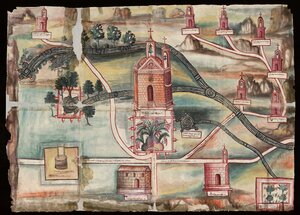
From native Indigenous societies who inhabited the Americas, to the Europeans in search of imperial expansion, to the forced arrival of enslaved Africans to American territories, this class will study how these diverse populations constructed their own identities and sense of belonging along the lines of bodies of lands and water, consequently establishing their own border thinking.
The colonization of the Americas has been defined as rooted in “the histories of borders” (W. Mignolo, The Idea of Latin America); histories that point out to territorial imaginings and disputes that contributed to a sense of belonging. If we describe a border as “the outer edge of anything; the extreme part or surrounding line, the confine or exterior limit of a country, any region or tract of land” (Webster Dicitionary), it is clear that traditionally, borders have been understood as part of a geopolitics that underlines a connection with the land. However, what happens when we extend those constructed outer edges that define a border to bodies of water? How can bodies of waters such as rivers and oceans be thought as contested sites where border identities are formed? This course examines the role of land and water as colonial sites of cultural encounters, negotiations, and clashes that shaped the identities of the population who inhabited them. From native Indigenous societies who inhabited the Americas, to the Europeans in search of imperial expansion, to the forced arrival of enslaved Africans to American territories, this class will study how these diverse populations constructed their own identities and sense of belonging along the lines of bodies of lands and water, consequently establishing their own border thinking. Other questions to be addressed are: How do gender, race, and ethnicity affected their own sense of identity? What role does social and physical space played in their view of themselves and others? Religious views, notions of labor, mestizaje, cultural practices, ecological and environmental concerns, and violent encounters, will constitute important aspects in the understanding of the conflicting identities that emerge in the colonial texts to be studied. Primary texts to be examined include travel and geographic accounts, legal documents, tratados, chronicles, códices, paintings, maps, and documentaries.